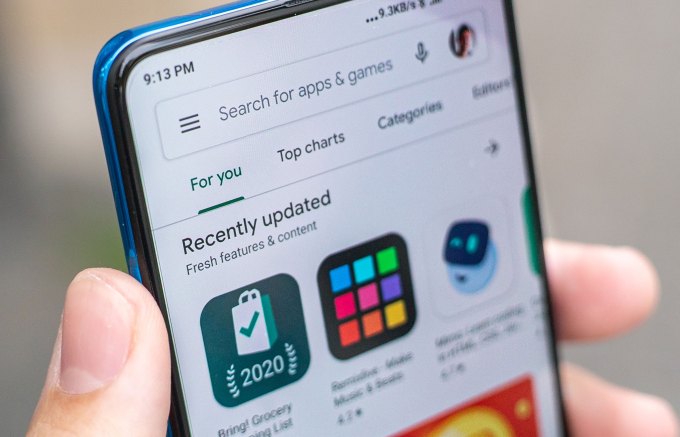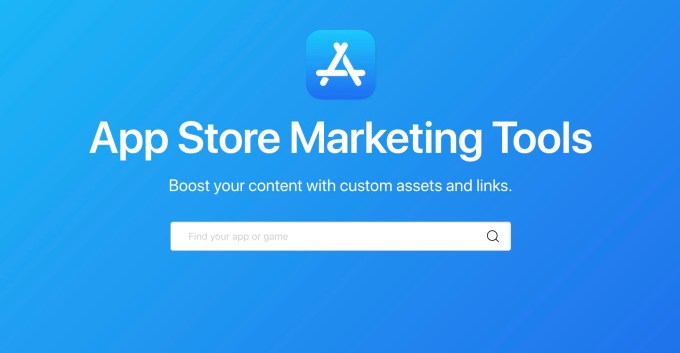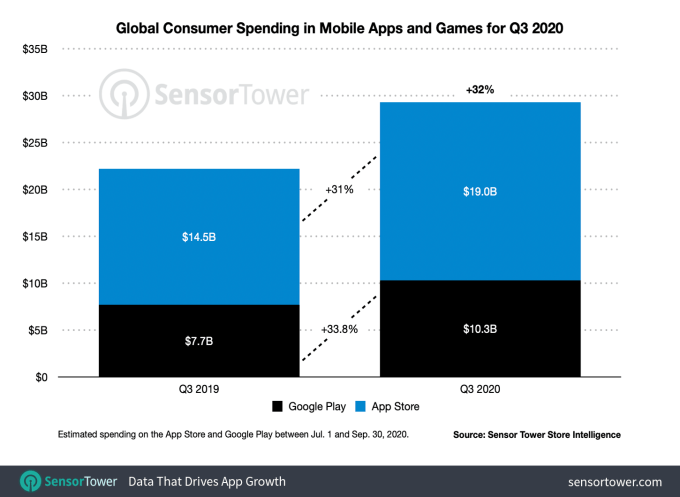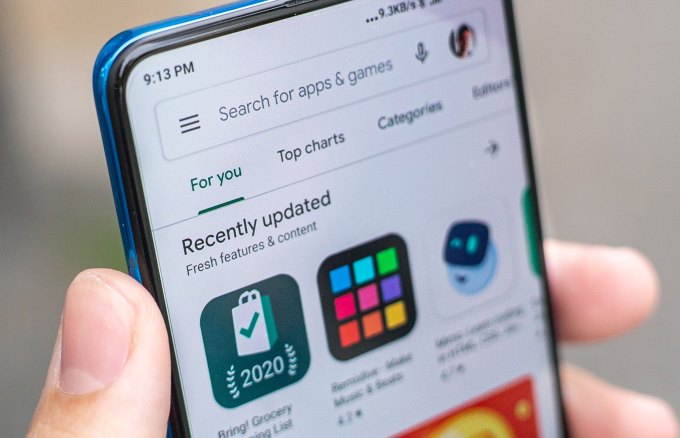Welcome back to This Week in Apps, the TechCrunch series that recaps the latest OS news, the applications they support and the money that flows through it all.
The app industry is as hot as ever, with a record 204 billion downloads and $120 billion in consumer spending in 2019. People are now spending three hours and 40 minutes per day using apps, rivaling TV. Apps aren’t just a way to pass idle hours — they’re a big business. In 2019, mobile-first companies had a combined $544 billion valuation, 6.5x higher than those without a mobile focus.
In this series, we help you keep up with the latest news from the world of apps, delivered on a weekly basis.
Google changes its app store rules, too

Google Play Store screen
Just a couple of weeks ago, Apple revised its App Store rules to permit game streaming apps and clarify rules around in-app purchases, among other things. Now, Google has updated its rules, as well.
Under threat of regulation, Google announced this week it’s updating its Google Play billing policies to better clarify which types of transactions will be subject to Google’s commissions on in-app purchases. While the more detailed language doesn’t actually change the earlier policy’s intention, it will impact a percentage of developers who don’t currently use Google Play’s billing system when selling digital goods in their app.
In addition, the company announced it will make changes in Android 12 that will make it easier for users to install and use third-party app stores as an alternative to Google Play.
The company says that its current billing policies only apply to less than 3% of apps on Google Play. Of those apps, 97% already use Google Play’s billing library. That means there’s only a small percentage of apps that will need to come into compliance under the clarified terms.
The rules seem to want to bring into compliance larger services skirting in-app purchase rules, like Netflix and Spotify. But it’s not clear yet how permissive Google will be about allowing apps to communicate alternative ways to pay. Currently, Google says developers can tell users about how to sign up and use alternative payments outside of the Google Play app. But we don’t know if Google will allow such a link to be prominently placed on an app’s home screen, how it will allow such a link to be worded or whether an app can cater only to existing subscribers, and other key factors.
EU rule could force Apple and Google to share customer data, ban pre-installed apps
Image Credits: TechCrunch
Major tech companies, including Apple and Google, may be required to share customer data with rivals, if a proposed EU rule, the Digital Services Act, comes to pass. The rule takes aim at anticompetitive business practices among tech’s top players, like Apple, Google, Amazon and Facebook. One measure, detailed by The Financial Times, says platforms can’t use the data they collect for their own commercial activities unless that’s shared with businesses pursuing the same activities.
The draft also currently recommends that big tech companies could be prohibited from favoring their own services on their websites and platforms, meaning they couldn’t pre-install their own apps on laptops or phones, or forced businesses to pre-install their apps to gain access to their platform. In practice, that could mean Android phones that ship without Google apps, like Gmail or Drive, or iPhones without stock apps beyond those that offer core functionality, like the Camera.
In addition, another clause would ban the tech companies from blocking rivals that offer their products to customers outside the gatekeeper’s own platform, Reuters reports. This could impact the current app store rules around payments and in-app purchases.
Anticipating regulatory pushback, Apple has made small concessions with iOS 14. Already, Apple had allowed users to delete some, but not all, of its stock apps. In iOS 14, Apple now lets users select their preferred web browser and email app, too. And both it and Google (see above) recently modified their app store guidelines to offer more clarity with regard to their right to collect platform fees in specific circumstances.
Apple and Google will, of course, object to any attempts at regulation. Google, in a submission to the Act, argued that a platform may only have market power in some sectors, but could be a new entrant or marginal player in others.
Platforms

Image Credits: Apple screenshot via TechCrunch
- Apple releases new app marketing tools. Apple introduced new tools that allow developers to generate short links or embeddable codes that link to their App Store product page. These can also display your app icon, a QR code or an App Store badge.
- Second public beta of iOS 14.2 and iPadOS 14.2 arrive. The releases bring new emoji (see below), plus changes to the Now Playing screen in the Control Center and the Home app.
- Apple’s iOS 14.2 will bring new emoji. A new set of emoji are being tested in the beta version of iOS 14.2. The update will include the transgender flag, a smiling face with tear, pinched fingers, two people hugging, some insects and animals, a disguised face and more.
- Google takes aim at beauty filters. Pixel phones will update to ensure face retouching features are off by default while labels and icons use “value-free” descriptions. The company said the decision to tweak the interface was based on expert recommendations over filters’ impact on people’s self-confidence and mental health.
- Android Partner Vulnerability Initiative launches. The program will focus on managing security issues specific to Android OEMs, drive remediation and provide transparency to users about issues Google discovered that affect device models shipped by Android partners.
- Apple bans more RSS readers in China App Store. Apple is still scouring its App Store for any services that don’t comply with Chinese censorship laws. This week, RSS reader apps — Reeder, Fiery Feeds and others — said their apps had been removed from the China App Store over content deemed “illegal.” Fiery Feeds only had around 1,000 MAUs, but Feedly’s latest app had 100K downloads.
Services
- Google Play Passlaunches in 24 new European countries. The deal brings Google’s subscription-based apps and games store to 34 total markets, including the U.S.
- Twilio launches an app for frontline workers, a new IoT platform and a free video service, Video Web RTC Go. The latter allows you to add 1:1 video chat to mobile and web apps, like those aimed at distance learning or remote client consultations. It also launched Twilio Frontline, a React Native-based app for frontline workers who need to communicate with customers.
Trends

Image Credits: Sensor Tower
- Designer earns six figures in six days for iOS 14 icon set. In a blog post, indie designer @traf details his experience building custom icons for the iOS home screen redesign trend. After a tweet showing off his home screen gained interest, he quickly created a website to sell his icon packs. Then YouTuber MKBHD linked to him and soon, he was making big sales. The day after the video, sales jumped from $6K to $40K, and as of the time of writing the post this week, the set had earned him $116,147.
- Global app revenue up 32% year-over-year in Q3. Sensor Tower reports worldwide consumer spend grew to $29.3B and installs reached 36.5B across the App Store and Google Play in the third quarter. TikTok aws the highest-earning non-game app globally and the most downloaded.
Other News
- Indian startups explore alternative app store to fight Google’s monopoly. More than 150 startups and firms in India are working to form an alliance and toying with the idea of launching an app store to cut their reliance on Google, TechCrunch reported this week. Participants include Paytm co-founder and CEO Vijay Shekhar Sharma, Deep Kalra of travel ticketing firm MakeMyTrip, and executives from PolicyBazaar, RazorPay and ShareChat.
- App Store fees legal battle to be tried by a judge, not jury. Apple and Epic Games agreed this week that their court battle should be decided in a bench trial by a judge, not a jury. Apple had previously been pushing for a jury trial, but withdrew its request. The judge suggested a jury trial is preferred, as it would have allowed real people to have a voice on what’s shaping up to be a major anti-trust case. She also had harsh words for many of Epic’s tactics and arguments presented so far, noting that walled gardens already exist elsewhere and Fortnite players have many other places to play besides iOS.
- Astropad comes to Windows. A company sherlocked by Apple brought its Astropad system to Windows. The company’s dongle turns an iPad into a second display, now for a Windows PC, a market Apple’s Sidecar doesn’t address.
- TikTok’s U.K. numbers revealed. A leaked marketing presentation revealed that 1 in 4 U.K. users now launch TikTok every months, with 17 million users spending over an hour per day on the app. That means the app has achieved a following almost half as big as Facebook in the market in just three years.
- TikTok launches a U.S. elections guide. The company promised not to save users’ political affiliations for use in ad targeting or recommendations.
- Google Maps rolls out improved AR directions. Google Maps updated Live View, its AR walking directions feature that launched last year. The feature, which uses the camera and GPS to help you navigate, can now be invoked from the transit tab, identify landmarks in major cities, and use Live View in combination with Google Maps’ location sharing feature.
- Microsoft’s Bing search app will appear as a download prompt on new Android phones in Germany, the U.K. and France after it won slots in a Google auction for rivals.
- Jamf acquires Mondada. MDM solution provider Jamf bought Melbourne-based Mondada, the maker of patch management solutions, Kinobi and Kinobi Pro. The deal will allow Jamf to expand Jamf’s application lifecycle capabilities, it said.
- Bloomscape raises $15 million, acquires plant care app Vera. Online garden shop Bloomscape raised a $15 million Series B from General Catalyst and others for its e-commerce business that ships live plants to customers’ homes. It also bought Vera, a plant care and tips app, for an undisclosed sum.
- Homer raises $50 million. Early learning app maker raised $50 million from Lego, Sesame Workshop and Gymboree for its apps that focus on early literacy and soon, more.
- Humane raises $30 million Series A to build the next iPhone…or something. Humane’s ex-Apple founders, Imran Chaudhri and Bethany Bongiorno, haven’t revealed what they’re working on, but are promising to build something that’s as groundbreaking as the iPhone. Chaudhri had worked on the original UI design of iPhone and iPad and Bongiorno helped launch iPad. They believe technology is a net negative for society as it’s been built today, and their idea is to come up with a new computing vision entirely.
- Macrometa raises $7 million. An edge computing service for app developers, Macrometa raised a $7 million seed round led by DNX Ventures for its Global Data Network that allows developers to send app requests to regions closest to them.
- Beijing-based Sina Corp. agrees to go private in $2.6 billion deal. The company is the latest to delist following growing scrutiny from U.S. regulators.
HoloVista
Mixed reality storytelling developer Aconite launched its new, story-driven puzzle game HoloVista on iOS, where players explore environments with the iPhone’s 360-degree camera in a mysterious mansion full of secrets. The game combines elements of hidden object search, puzzles and social media as you play as Carmen, a junior architect and new hire at an exclusive firm. The game also touches on themes like society’s focus on social media, for example, and our relationship with technology ($4.99 on the App Store).













